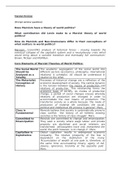Marxism Revision
(Prompt seminar questions):
Does Marxism have a theory of world politics?
What contribution did Lenin make to a Marxist theory of world
politics?
How do Marxists and Neo-Gramscians differ in their conceptions of
what matters in world politics?
Marxism: ‘[scientific] analysis of historical forces – moving towards the
eventual collapse of the capitalist system and a revolutionary crisis which
would bring about a socialist transition and eventually full communism’.
Brown, Mclean and McMillan.
Core Elements of Marxist Theories of World Politics:
The Social World The academic segregation of the social world into
Should be different sectors (economics, philosophy, international
Analysed as a relations) is unhelpful. All should be understood in
Totality relation to the other.
The Materialist Processes of historical change are a reflection of the
Conception of economic development of society. The central dynamic
History is the tension between the means of production and
relations of production. This relationship forms the
economic base of society. As modes of production
change, a period of social changes ensues whereby
relations of production are changed in order to
accommodate the new means of production. The
transforms society as a whole because ‘the mode of
production of material life conditions the social,
political and intellectual life process in general’. Marx.
Class is Marxists believe that society is systematically prone to
Fundamental class conflict: ‘the history of all hitherto existing
societies is the history of class struggle’. Marx.
Committed to Marxists are committed to change and emancipation.
Emancipation They seek a society where wage labour and private
property are abolished and social relations are
transformed: ‘philosophers have only interpreted the
world, the point however, is to change it’. Marx.
Capitalism is Global capitalism results in widespread economic
Exploitative inequality. The relative prosperity of the few is
dependent on the destitution of the many:
‘Accumulation of wealth at one pole is, therefore, at
the same time accumulating misery, agony of toil,
slavery, ignorance, brutality at the opposite pole’.
Marx.
, Marx: What Did He Believe?
- Believed history has a progressive quality; structures grow, mature and
die
- Mode of production punctuates history
- Modes have characteristic relations of production (classes) and forces
of production (industry)
- Whilst Marx was critical of capitalism, he believed it was essential to
have it in order to motivate and shape the proletariat and result in
socialism
- Class is central to his understanding of capitalism; class is the idea that
people can be grouped together based on their relations of production.
- Marx assumed a world in which any labour produces value (labour
theory of value). Some of the value of your labour would go towards
your wage, and the surplus value would be stolen by the capitalists.
Marx argued that the class that owned the means of production
exploited the other class by extracting this surplus value.
- Marx observed that factory production would concentrate workers
together, raise their class consciousness and provide the basis for
revolution (the next mode of production).
- Capitalism, by bringing workers together, would create the force that
would ultimately destroy it
- Marx did not value the principle of sovereignty, he believed that world
politics was about class solidarity across the nations: ‘Workers of the
world, unite!’
- Logic of capitalism is what drives state behaviour, and not the
condition of anarchy. Worth pointing out that Marx was living within a
period of relative peace in Europe, hence why he focussed less on
inter-state violence.
- Capitalism is prone to problems, these problems stimulate much of the
conflict attributed to other causes. To have peace in IR, capitalism
needs to end.
- Capitalism is anything used in a process of creating economic value.
For example, your bed at home does not accumulate capital. But if
your bed was in a hotel, it will accumulate capital.
- For Marxists, an important source of crisis in capitalist economies is
when a disjunction develops between levels of investable funds in an
economy (potential capital) and opportunities for profitable
investments. Crisis occurs when there is over accumulation (more
capital than investments). A way out of this crisis would be imperialism
and exporting capital overseas.
- In capitalism, for Marx, workers are free. The core relationship in any
society is between producers of value and those who control/ benefit
from this production. In capitalism, this is between the proletariat and
the bourgeoise. What is unique however, about the proletariat is that
unlike feudal salves and peasants they are free. The latter could be
killed by their employers for wanting to leave, whereas the proletariat
did not face the same kind of legally binding relationship as previously




